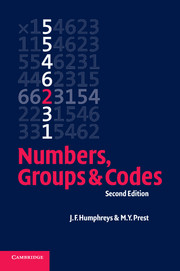Book contents
- Frontmatter
- Contents
- Preface to first edition
- Preface to second edition
- Introduction
- Advice to the reader
- 1 Number theory
- 2 Sets, functions and relations
- 3 Logic and mathematical argument
- 4 Examples of groups
- 5 Group theory and error-correcting codes
- 6 Polynomials
- Appendix on complex numbers
- Answers
- References and further reading
- Biography
- Name index
- Subject index
6 - Polynomials
Published online by Cambridge University Press: 05 September 2012
- Frontmatter
- Contents
- Preface to first edition
- Preface to second edition
- Introduction
- Advice to the reader
- 1 Number theory
- 2 Sets, functions and relations
- 3 Logic and mathematical argument
- 4 Examples of groups
- 5 Group theory and error-correcting codes
- 6 Polynomials
- Appendix on complex numbers
- Answers
- References and further reading
- Biography
- Name index
- Subject index
Summary
Introduction
We have mentioned polynomials on a couple of occasions already, but now is the time to take a closer look at them.
A (real) polynomial functionf is a map from the set ℝ to itself, where the value, f(x), of the function f at every (real) number x is given by a formula which is a (real) linear combination of non-negative-integral powers of x (the same formula for all values of x).
An example of a polynomial function is the function which cubes any number x and adds 1 to the result: we write f(x) = 1 · x3 + 1 or, more usually, f(x) = x3 + 1 since a coefficient of 1 before a power of x is normally omitted.
An expression, such as x3 + 1 or x6 − 3x2 + ½, which is a (real) linear combination of non-negative-integral powers of x (and which, therefore, defines a polynomial function) is usually referred to as a polynomial with coefficients in ℝ (or with real coefficients). It is also, of course, possible to consider polynomials with other kinds of coefficients: for example we might wish to allow coefficients which are complex numbers; or we might wish only to consider polynomials with rational coefficients, etc. In such cases we refer to polynomials with coefficients from ℂ, or ℚ, etc.
Notice that the following polynomial expressions all define the same function: x3 + 2x − 1, x3 + 0x2 + 2x − 1, −1 + 2x + x3 + 0x5.
Information
- Type
- Chapter
- Information
- Numbers, Groups and Codes , pp. 255 - 291Publisher: Cambridge University PressPrint publication year: 2004
